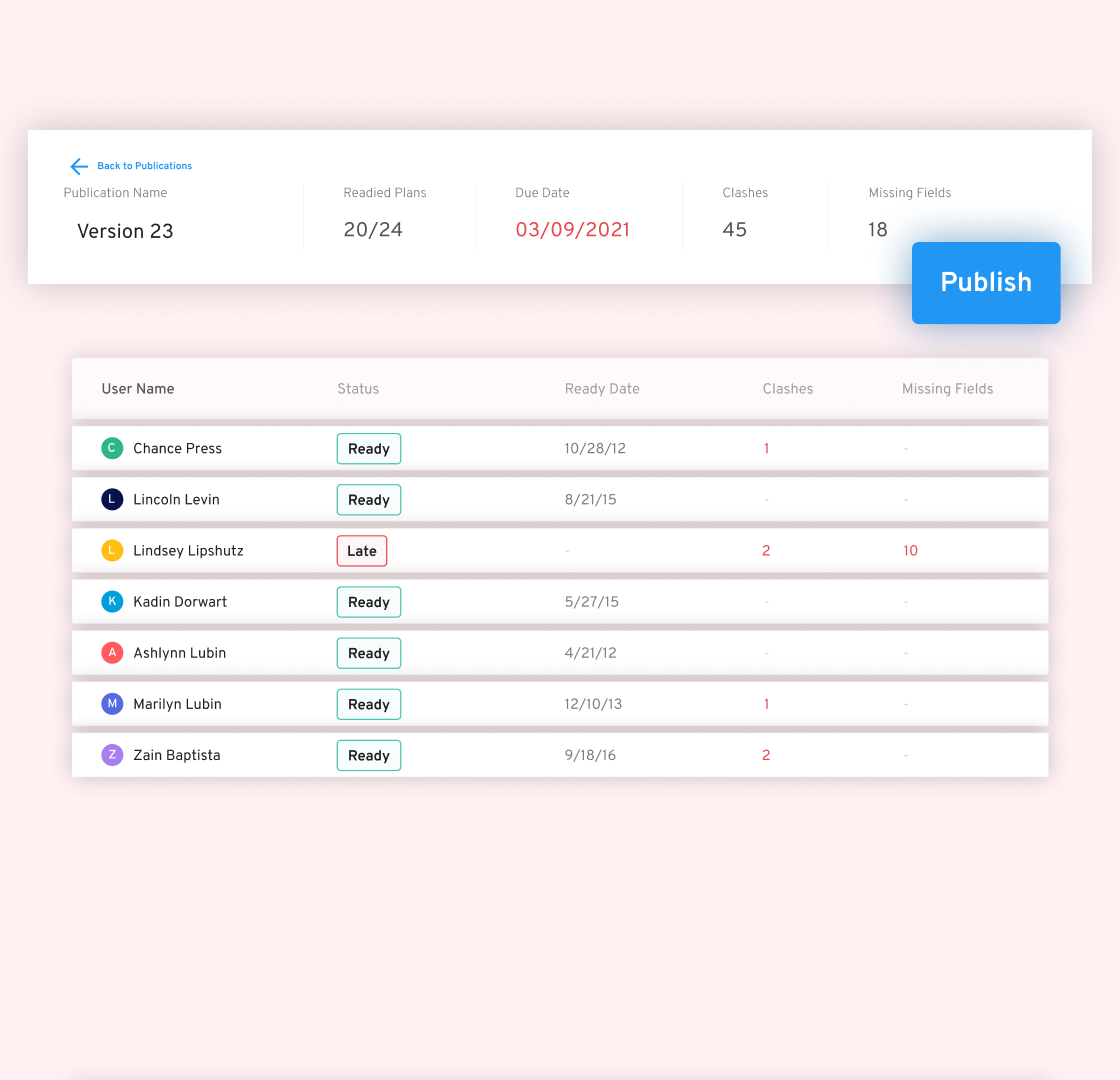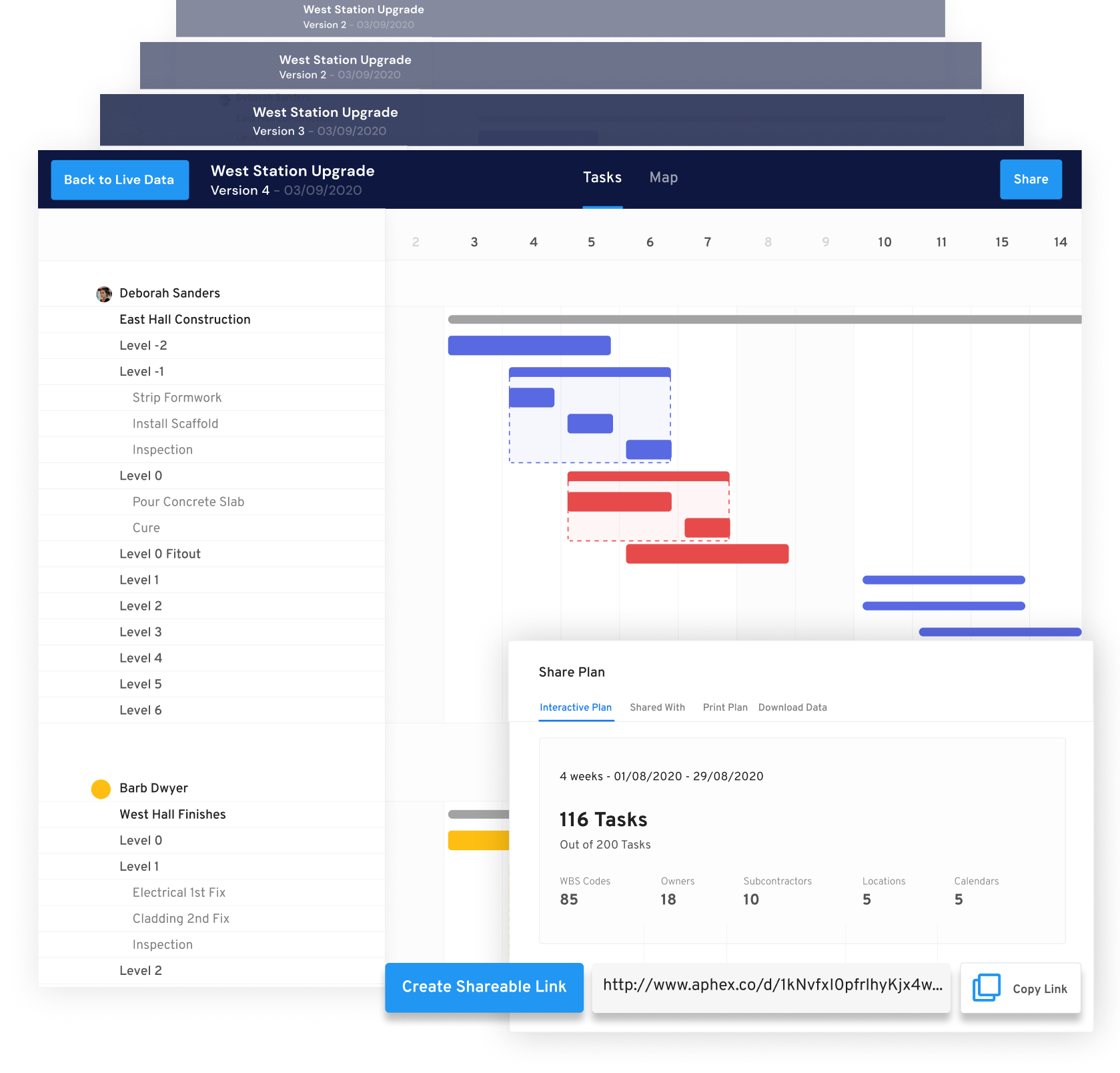Announcing Aphex Field
Aphex Field helps connect site workers to engineers and planners. Read on to discover how it can help improve your project.
Communication is often the make-or-break of a construction project, from large scale hyper-infrastructure endeavours, down to specific small scale works. More than that, communication is often the make-or-break across the board in life. Who was in charge of booking that table on Friday? Were Ross and Rachel on a break? Why have we all ended up in the Warzone Gulag again in Call of Duty?

Thinking about the communication of short term lookahead plans, and the issues and pain points we have learned about from our users' projects, it's tempting to focus on the granular questions that can lead to exciting new functionality - how much of the plan do users want to share? When do they want people to receive it? Should it be projected, printed or discussed?
But really, in order to unlock truly purposeful, impactful communication for our users we needed to dig into the why of sharing. We analysed where communication breaks down on projects. Why plans don't happen... and set about solving that problem from the ground up. Once we focused on this, the work on developing digital approaches around how and where to share, all fell into place.
Publication deadline day. D-Day (if D means 'D-efinitely not leaving this office before 11pm because I'm waiting on 15 plans to be sent across, and am playing P6 Tetris trying to get them to fit together...)
Lookahead submission deadlines are no bad thing in of themselves. They are a tried and tested approach to getting ideas out of the minds of a few and onto a plan that can be understood by others. They also often add a sense of structure to the weekly Planning process, as a Thursday PM deadline might establish Wednesday co-ordination meetings, Thursday morning lookahead updating sprints etc... Teams use routines to keep everyone in sync, and Aphex now takes some of the burden of keeping everyone aligned to a routine while tracking its progress.
Publishing is a new workflow in Aphex, though the routine has existed for our users for decades. Essentially, by adding in a way for Engineers to signal that they're happy with their part of the plan, confidence and meaningful collaboration are increased, while increasing that sense of ownership too.
A few key settings, and decisions taken by your project set up team, let us guide and prompt at just the right times to ensure the publications are not only ready to be published on time, but that they consistently have the correct lookahead period, key data fields assigned to tasks and subtasks, and as few clashes as possible.
Breaking it down, the publication part of this work flow eradicates three consistent headaches for planners:
Aphex is a live, collaborative platform where all of the engineers are building up their plans in a common environment. Beyond this, they are all using the same Project Assets - or building blocks. Using a common set of locations, structures or resources so that when they are combined they fit together, and also do so in a language that the Planner can understand too. The final piece of the puzzle was increasing visibility over who had done what, and when - a plan readied 6 days early might well need a re-vamp before publishing! Now in Aphex, you can quickly and easily see who is on track, who's missed any key sections, and who might need reaching out to ahead of the deadline.

Our publishing workflow then, gives planners all of the outcome, but none of the admin work! By focusing on control and clarity, the benefits of this extra quality assurance check in your sharing process has really filled a gap in how Aphex can help put everyone in the project in an informed position to move forward with their project.
There's also no real limit here, just because the scheduled publication is on Thursday PM, doesn't stop you from publishing a few days early so you can distribute a specific version of the plan - or equally holding off a few days to give the team time to make some crucial updates.
It might not be the publishing that Penguin Randomhouse do, but we'd put it in a red cover.
Spending some time establishing a way that teams could have greater confidence in the source of what they were sharing, through publishing, allowed us to open up functionality around what could be shared. That extra step may take one or two more clicks that the previous version of Aphex, but quick and easy fall flat if the output is patchy, not quite up to date, or confusing!
Typical stresses from our users included Planners who really were faced with two options, creating one massive gantt and sending out to a large group, and in doing so pass a time-intensive task off to delivery teams, engineers and people who really didn't want to spend an evening sifting through a 30 page document to find their part. Or, the other option was for that same planner to curate and create endless custom print outs, sequence decks and versions of the gantt themselves.
These variations can seem endless, as everyone cares about something a bit different across projects. Subcontractors might care about their scope, Clients focus on upcoming milestones, and different members of the team only need to view certain parts of the plan at certain times.
We've broadened how you can share plans on Aphex, learning from Planners, Engineers and Managers. For a wholly unrestricted view of the live state of the project, Aphex users can invite people in as viewers. Safe in the knowledge that these people can then keep their finger on the pulse, but without any risk of accidental amendments, edits or even deletion.

Ever found yourself muttering "I shouldn't have said that"? We understand that in most instances sharing the entire live plan might be lifting the curtain a little too far back, so we have developed a whole host of ways to share out and refine those top quality published versions.
So by framing the different whys of sharing plans, the control and choice that our users can now enjoy is heightened.
We spent time investigating the relationship between communication and common problems our users were coming up against. Versatility in how different people need to run through the short term lookahead at different times became a common thread in these discussions. In some cases, the team will gather around projectors displaying Planner’s Collaboration Slides and Gantt. A sequence of works and the allocated resources will be agreed on, before locking in the plan and creating PDF versions, to distribute to the supply chain. So we made the connection between running through the plan, and creating the customised version sleeker. We also focused on visual additions to the sharing suite, where walking through specific work areas highlight these to focus attention and remove room for confusion. No more crying out "You're tearing me apart Lisa!"
In other cases, our users were seeing seismic shifts in their companies approach as a whole, with a focus on levelling up their digital workflows, and putting agile, responsive strategy at the forefront. Our interactive versions fit in to this wider movement, allowing non-Aphex users to view, interact and understand shared versions of the plan like never before. This shiny, new functionality doesn't just help keep the cost of paper printing down, it also enables partnerships between client and contractor, in an efficient, tech first way too.
We will continue to focus on purposeful collaboration, particularly in the Publishing and Sharing workflow. As hybrid working, innovation in construction and the moments and roles that team members hinge on continue to evolve, so must our approach to how people can share and communicate reliable, trusted plans. More importantly, we will continue to explore why sharing occurs at specific moments, and what the next big collaborative shift will be.
I'm not talking Black Mirror, but the AI, 4D, and BIM advancements are pretty ground breaking and we're only just getting stuck in to 2021. Maybe just like podcasts have swept the nation, audio lookahead presentations will be the next big thing...
If you can think of anything that would make collaboration and communication really resonate across your whole team, or maybe you have some out of the box thinking around the next move in presenting short term lookaheads, do get in touch. Chip in to the work we're doing at AphexHQ and really make a mark on helping teams fully gain control of their plans and data.
As always, do get in touch with thoughts, questions and feedback. Until then, Happy Planning!
Aphex Field helps connect site workers to engineers and planners. Read on to discover how it can help improve your project.
The old ways of planning projects simply don't work as well as they should. Cloud based construction planning software can help improve performance...
Our 90's mascot 'Pete Pepper' talks floppy disks, project planning, Gantt charts, and master schedules in this vintage construction planning video.
Be the first to receive all the latest tips, insights, and updates when you subscribe to the Aphex blog.